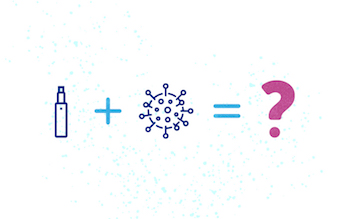Vaping and COVID-19: A toxic blend?

With the COVID-19 pandemic keeping most of us sheltering at home, teens who vape are facing a reckoning. Should they quit vaping? What if they can’t?
“Some of our patients have successfully quit vaping, and tell us that ‘stay at home’ orders have helped, because they’re not around their friends who use,” says Dr. Sharon Levy, who directs the Adolescent Substance Use & Addiction (ASAP) program at Boston Children’s Hospital. “For others, being isolated has made them more anxious. Some are using more than before.”
People who are willing to work hard can still get vaping products, Dr. Levy acknowledges. “Unfortunately, for some kids this means leaving the house and potentially exposing themselves to COVID. Some are still sharing vapes with their friends, which is very, very dangerous.”
Other teens have quit, whether they wanted to or not, and are suffering withdrawal symptoms. “The good news is we can help with that,” says Levy, who notes that online “virtual visits” are available to support vaping cessation (see box below). “Call your doctor. There is a lot we can do.”
Does vaping put me at greater risk for COVID-19?
As of yet, COVID-19 patients haven’t been systematically studied to see how many of them vape. But doctors’ observations and much indirect evidence point to the possibility that vaping could raise the risk not only of catching the new coronavirus, but also getting very sick from it.

Early surveillance data indicate that substance users are at higher risk for COVID-19. For example, studies of COVID-19 in China have found that smokers in general are at risk for more severe disease.
Dr. Alicia Casey cares for children and teens with lung disease at Boston Children’s. She is especially concerned about COVID-19 in light of the outbreak of EVALI, or e-cigarette- or vaping-associated lung injury, that began last summer. As of February 18, 2020, EVALI had put more than 2,800 people in the hospital, with 68 deaths. An array of scientific studies indicate that vaping, like smoking, inflames and damages the lungs.
“We’re concerned that if teens have underlying lung damage from vaping, and get COVID-19 on top of that, they could have worse outcomes,” Dr. Casey says.
This year’s influenza season heightened that concern. “We’ve seen patients who vape having more significant and more prolonged influenza symptoms, worse than we would have expected,” Dr. Casey says. “These teens were otherwise healthy and shouldn’t have had to be admitted to the hospital for the flu.”
Related: Five lessons learned from our vaping service
One recent analysis suggests that nicotine, in general, increases the number of ACE2 receptors on lung cells, which act as “entry portals” for coronaviruses. Increasing the number of receptors could enhance the new virus’s ability to infect us, although the study didn’t look at vaping separately from smoking.
What if I’m only vaping marijuana?
Again, there are no direct studies. But based on what’s known from the EVALI outbreak, Dr. Casey believes marijuana products pose even more of a risk than tobacco in reducing the body’s ability to avoid respiratory complications from COVID-19.
“We know that 85 percent of patients with EVALI reported vaping THC products, and only 15 percent reported exclusive nicotine product use,” she says. “One of their components, vitamin E acetate, has been implicated as a cause of EVALI and was found mostly in marijuana products.”
Vitamin E acetate is one of several components used to get both THC and nicotine into a solution that can be vaped. Flavorings added to vapes are also a hazard, evidence suggests.
“The ingredients that have been allowed in vape products are generally recognized as safe for the skin, or safe in food, but none of these things have had toxicology testing in the lungs,” says Dr. Casey. “Even the flavorings, when heated, become toxic chemicals that don’t belong in the lungs, including formaldehyde.”
In short, Drs. Casey and Levy urge teens to avoid both vaping and smoking — in general, but especially during the COVID-19 pandemic.
“This is a good time to talk to your parents or other trusted adults about getting help,” Dr. Casey says.
If you’re trying to quit
The ASAP program is open during the COVID pandemic, offering counseling, medications, and a “virtual group” for teens sheltering at home. ASAP can be reached at 617-355-2727.
“Withdrawal, anxiety, depression and other physical and emotional symptoms can be successfully treated,” says Dr. Levy. “We are also working with parents to help them support their children.”
These websites can connect you to resources and support groups:
Thetruth.com
Mylifemyquit.com
Truthinitiative.org/thisisquitting
Becomeanex.org
Therealcost.betobaccofree.hhs.gov
Teen.smokefree.gov
You can also:
Text DITCHJUUL to 88709
Call 1-800-QUIT-NOW
Get more answers about Boston Children’s response to COVID-19.
Related Posts :
-

Parsing the promise of inosine for neurogenic bladder
Spinal cord damage — whether from traumatic injury or conditions such as spina bifida — can have a profound impact on bladder ...
-

Unveiling the hidden impact of moyamoya disease: Brain injury without symptoms
Moyamoya disease — a rare, progressive condition that narrows the brain’s blood vessels — leads to an increased risk of stroke ...
-

Forecasting the future for childhood cancer survivors
Children are much more likely to survive cancer today than 50 years ago. Unfortunately, as adults, many of them develop cardiovascular ...
-

Genomic sequencing transforms a life: Asa’s story
Asa Cibelli feels like he’s been reborn. The straight-A middle schooler plays basketball and football, does jiu jitsu, is ...





